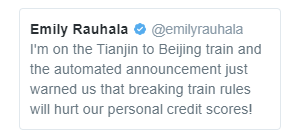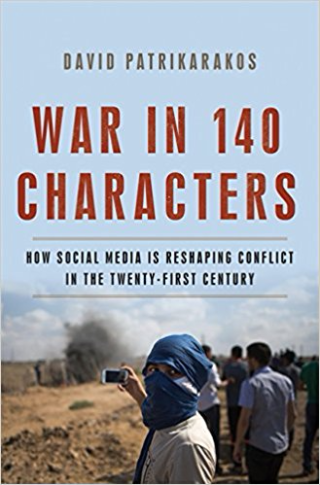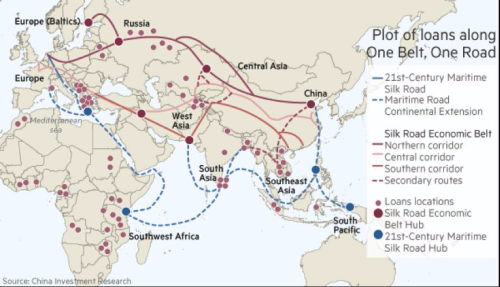John Robb's Blog, page 2
March 16, 2018
When ALL Gun Owners are Shunned
When it comes to politics, it should be of no surprise to anyone that we're in uncharted, nonlinear territory now.
Weaponized social networks have seized control of the political process from the traditional political parties and their media gatekeepers. They are in charge now and, more importantly, they are rapidly evolving. Getting more powerful with each passing day.
Here's a good example of how that evolution could could quickly (nearly overnight) go non-linear and plunge us into civil turmoil.
One of the weaponized social networks I'm currently covering is a loosely connected network built on a newly emergent consensus morality (#metoo, etc.). A consensus that it uses to successfully wield social, and increasingly, political power.
This moral network recently expanded with the addition of the #neveragain movement, after the Parkland shootings. In the past, a movement like #neveragain would be focused on gun control through changes in government legislation. Now that it's part of this weaponized moral network, that focus is going to change.
Why? This weaponized network isn't interested in just changing legislation. It's far more ambitious than that. It wants to change everyone's behavior and it is building the means to do it. Here's how.
As we've seen with #metoo and the doxing of #altright, this network is strongest when it personalizes its attacks. It does this by using the network to discover, document, and then punish the behavior of specific individuals for violations of this consensus morality. So, even if something isn't illegal or within your rights as an individual, you will still get publicly slammed.
For example, if you say something considered hate speech online (Jack Murphy is a good example), you will lose your job and access to society (in his case: coaching his son's Little League team). Or, if a rumor of workplace harassment puts you on a list, you will get fired or (at least) socially ostracized.

Mass Shunning: Student protesters turn their backs to the White House for 17 Minutes
With this in mind, how will the moral network personalize attacks against people who own guns legally?
They won't do it by discussing it on the TV talk show circuit or pushing new legislation. The members of this network have already lost faith in that process.
They will do it by establishing strict moral limits on the capacity of an individual to commit acts of violence. You can already see this new 'consensus' emerging. A growing sense that anyone who owns a gun is immoral, unsafe, and a threat to society.
With that goal mind, the network can get working on the next step: shunning gun owners en masse and disconnecting them from society until they recant.
At this point, this doesn't seem possible, without legislation to back it up. However, that can change quickly. This effort gets teeth, and the capacity to impact millions of people simultaneously, through a list. A list of gun owners. A list built in part using leaked/stolen government data and through the reporting of friends, family, neighbors, coworkers, and more. A list that is potentially stored in a blockchain for durability and enhanced with rumors (statements or pictures of people on the list that makes them look dangerous). With this list in hand, network members would then turn up the pressure on individuals:
Employers would refuse employment or fire individuals who own guns, in the name of workplace safety, at the urging of other employees.
Parents would put pressure on schools to ban the parents who own guns from attending school functions or put in place extra security at schools targeting children living in gun owning households.
With pictures and and a little open source facial recognition software, anyone on the list could be IDed by anyone with a smart phone.
Get the picture? In short, everything from getting access to a building to renting an apartment to getting a date could get very hard for reputed gun owners to do nearly overnight.
All without legislation or government regulations.
Scare you a bit? It should.
Sincerely,
John Robb
PS: For more on topics like this, check out the Global Guerrillas Report
January 19, 2018
Why Social Networking will get Worse
Facebook just announced sweeping changes to fix significant problems with its newsfeed, the main conduit for news and information for over 2 billion people. However, the problems with Facebook's newsfeed won't be fixed with these tweaks. In fact, they are likely to get much worse as Facebook attempts to fix them.
To understand why, let's jet back to 2001, years before Facebook and Twitter.
In 2001, the little software company I was at launched the first social networking product. The central feature of that product was the first newsfeed -- a presentation of the stream of updates you get from the people you are friends with and the pages you follow that you could interact with.
The reason I'm mentioning this is that one of the central discussions we had at the time was over how to organize the newsfeed. As we sorted through the options for organizing it, it was apparent even at that early stage that anything but the most basic sorting mechanism (simple reverse chronological order - newest at top) would eventually turn the newsfeed into a chaotic and unpredictable soup.
Keep this in mind as we flash forward to 2018.
In 2018, over 4 billion people are now using social networking, and the newsfeed is now the main conduit for news and information for over half the planet. However, these users aren't using the simple reverse chronological newsfeed we had in the first social networking product.
At Facebook, in particular, the newsfeed is actively managed and sorted -- by algorithms and increasingly, AIs -- to maximize the time people spend on the network and the revenue generated by their interactions. That effort is why the Facebook newsfeed has become a chaotic soup yielding unpredictable outcomes.
To see why failure was (and will continue to be) inevitable, let me recast the situation:
Facebook is actively micromanaging the information flow and social interactions of over 2 billion people, and insanely complex and highly uncertain task.
Facebook is making the sweeping decisions on how to micromanage the newsfeed centrally (with a small team of young executives empowered to relentless tweak the system by the dictatorial fiat of the company's CEO).
Facebook's goals are a selfish utopianism (in its version utopia, the world revolves around Facebook).
See the inevitable problem now?
This is similar in so many ways to the source of the failure we saw with 20th Century Communism. They believed it was possible to centrally manage the economic interactions of millions centrally based on an utopian vision.
Needless to say, those plans didn't work out well. These won't either.
Sincerely,
John Robb
(written on clear and cold winter day)
PS: This is just the start. Already, weaponized social networks are overwhelming political systems, transforming warfare/terrorism, and supercharging transnational criminal enterprise -- far more so than any of the threats that well funded military #cyberwarfare and civilian #cybersecurity protect against. Worse, as if that isn't enough, the ongoing path of development in social networking is taking us towards forms of societal repression that would make George Orwell blush (that's the subject of January's Global Guerrillas Report).
PPS: In a twist, one of the factors that is likely to drive FB towards increasingly heavy handed AI driven censorship will be the nonlinear behavior of the network caused by its constant micromanagement of the newsfeed.
January 9, 2018
Drone Swarm vs. Russian Base in Syria
The Russians have been using drone swarms against the Ukrainians to good effect (blowing up ammo dumps). Here's one being used against a Russian base on the coast of Syria.
Recount as reported by the Russian MoD reported it this morning:
Security system of the Russian Khmeimim air base and Russian Naval CSS point in the city of Tartus successfully warded off a terrorist attack with massive application of unmanned aerial vehicles (UAVs) through the night of 5th – 6th January, 2018.
As evening fell, the Russia air defence forces detected 13 unidentified small-size air targets at a significant distance approaching the Russian military bases.
Ten assault drones were approaching the Khmeimim air base, and another three – the CSS point in Tartus. Six small-size air targets were intercepted and taken under control by the Russian EW units. Three of them were landed on the controlled area outside the base, and another three UAVs exploded as they touched the ground.
Seven UAVs were eliminated by the Pantsir-S anti-aircraft missile complexes operated by the Russian air defence units on 24-hours alert. The Russian bases did not suffer any casualties or damages.
The Khmeimim air base and Russian Naval CSS point in Tartus are functioning on a scheduled basis. Currently, the Russian military experts are analyzing the construction, technical filling and improvised explosives of the captured UAVs.
Having decoded the data recorded on the UAVs, the specialists found out the launch site.
It was the first time when terrorists applied a massed drone aircraft attack launched at a range of more than 50 km using modern GPS guidance system. Technical examination of the drones showed that such attacks could have been made by terrorists at a distance of about 100 kilometers.
Engineering decisions applied by terrorists while attacks on the Russian objects in Syria could be received from one of countries with high-technological capabilities of satellite navigation and remote dropping control of professionally assembled improvised explosive devices in assigned coordinates. All drones of terrorists are fitted with pressure transducers and altitude control servo-actuators. Terrorists’ aircraft-type drones carried explosive devices with foreign detonating fuses.
The Russian specialists are determining supply channels, through which terrorists had received the technologies and devices, as well as examining type and origin of explosive compounds used in the IEDs.
The fact of usage of strike aircraft-type drones by terrorists is the evidence that militants have received technologies to carry out terrorist attacks using such UAVs in any country.
Some NOTES: The swarm used what appears to be off the shelf tech. It was a small swarm (only 13), and it was divided (two targets), which made it impossible overwhelm defenses. It didn't fly low enough to avoid detection by anti-air. The swarm also appears to be remotely controlled, likely as a means to provide target acquisition and terminal guidance. This allowed defense units to hack them.
January 3, 2018
China's Socially Networked Repression
China's social credit score in action (it's how China is ushering in a long night of socially networked repression).
Essentially, this is a score that follows you for life. It's public and accessible.
It goes down: If you break any rules, say bad things online, pay a creditor late, or any of a rapidly expanding list of immoral things...
A negative score impacts your ability to access government services. The companies you can buy products from (they don't want to sell to people with low scores). Your friends and the people you can marry (they get a lower score if you have a low score).
China's dictatorship needed a way to control an advanced, socially networked society.
This is it.
December 31, 2017
The December Global Guerrillas Report and Podcast are UP!
The December Global Guerrillas Report: Weaponized Social Networks is now available.
It takes a hard look at the politicized social networks that overran the US political system last year and what that could mean down the road.
It was hard to write given the newness of the topic, but I think it paid off nicely. It should provide you with a solid framework for making sense of the political chaos that looms in the years ahead
Here is a snippet:
Also, I just posted the December 2017 Global Guerrillas Podcast
In it, I talk with David Patrikarakos about his new book “War in 140 Characters” and about how social networking is becoming decisive in the wars of the 21st Century (much more so than cyberwarfare).
Hope you enjoy the report and the podcast.
John Robb
December 18, 2017
China's Path to the Long Night: The Social Credit Score
China and the US are moving quickly towards a networked dystopia. I'm calling it the "long night" akin in ominousness to the dystopia Hayek saw ahead in his Road to Serfdom.
The long night is an all encompassing online orthodoxy. A sameness of thought and approach enforced by hundreds of millions of socially internetworked adherents. A globe spanning orthodoxy that ruthless narrows public thought down to a single, barren, ideological framework. A ruling network that prevents dissent and locks us into stagnation and inevitable failure as it runs afoul of reality and human nature.
China's path to the long night is through a universal "social credit score" -- a public online rating like seller ratings on eBay or product ratings on Amazon, but for people. A system that will be fully operational by 2020. However, unlike eBay/Amazon ratings or FICO's credit score, this rating won't be limited to rating a person's economic transactions. It will be a rating based on everything a person does. Worse, bad rating will negatively impact every aspect of your life. For example:
"The State Council has signaled that under the national social credit system people will be penalized for the crime of spreading online rumors, among other offenses, and that those deemed “seriously untrustworthy” can expect to receive substandard services.
“They will check what kind of friends you have. If your friends are all high-score people, it’s good for you. If you have some bad-credit people as friends, it’s not nice.”
This score “will ensure that the bad people in society don’t have a place to go, while good people can move freely and without obstruction.”
Unsurprisingly, a social scoring system is already being used as a tool of authoritarian oppression in China. A recent report by the AP shows how similar ratings are being used by the Chinese government to repress the Uighurs in Western China:
A document obtained by U.S.-based activists and reviewed by the AP show Uighur residents in the Hebei Road West neighborhood in Urumqi, the regional capital, being graded on a 100-point scale. Those of Uighur ethnicity are automatically docked 10 points. Being aged between 15 and 55, praying daily, or having a religious education, all result in 10 point deductions. In the final columns, each Uighur resident’s score is tabulated and checked “trusted,” ″ordinary,” or “not trusted.”
However, low scores in this system don't just degrade your access to services. People who score low are arrested and sent to ethnic reeducation camps so they can learn how to become real Chinese citizens.
Uighurs study “Mandarin, law, ethnic unity, de-radicalization, patriotism” and abide by the “five togethers” — live, do drills, study, eat and sleep together.
Sincerely,
John Robb
PS: December's Global Guerrillas Report will be out this week for patrons. It will cover the three ways the US, like China, will end up in a Long Night. I'm also trying out my first podcast this month. I've edited an interview with David Patrikarakos, the author of War in 140 Characters as well as some audio analysis of recent systems disruption in the US.
December 1, 2017
The Online War for the Future
Social networking radically increases the...
pace (in aggregate, it radically lowers the latency of communication)
bandwidth (the amount of information conveyed per minute), and
scale (number of simultaneous conversations + one to many broadcasting)
of communication beyond all historical measurements. Simply, this change is rewiring us. Not only that, with Facebook already at over 2 billion daily users, it is rewiring us all at once.
This isn't a voluntary change. It doesn't matter if you aren't connected when nearly everyone else is. Moreover, we can already see the results of this new wiring. The most obvious is the constant drumbeat of political chaos all around us. Social networking is is shattering the fictive kinship (our center of gravity) that allows us to operate as a cohesive country.
Not only that, it has created the opportunity for new forms of authoritarianism to emerge online. An authoritarianism that threatens to usher in a long night of repression and darkness. So far, I've identified three authoritarian movements (significant departures from the forms we've seen in the past), each dangerous in their own way:
An open source insurgency,
a socially networked orthodoxy, and
an algorithmic lockdown.
The best way to understand these movements is to dive into how they wage war and exercise power.
Sincerely,
John Robb
PS: This is the topic of December's Global Guerrilla Report. Hope you'll join me. BTW: November's GG Report on Reflexive Control is out. It demonstrates how primed the US is for authoritarianism. It surprised me when I wrote it (always a good sign of a great report).
PPS: I'm going to publish a podcast or two for patrons in December. Should be fun.
November 3, 2017
Announcing the Global Guerrillas Report
I've decided to publish a report on Global Guerrillas topics (a PDF and/or podcast interview) via Patreon. This report will allow me to dive a good bit deeper into a dangerous topic than would be possible with a post alone. It will also provide a way to get some discussion going again (not possible in an open forum).
I'll send the first report out to subscribers in a few days. It will be entitled:
Russian Interference, Reflexive Control, and Nonlinearity (beyond the ads, trolls, and fake news).
Hope you join me. Should be fun.
John Robb
Bonus: To kick off my first report I'll include a PDF outline of my "27 Rules for Global Guerrillas." It will include rules for open source insurgency and systems disruption, written in a sparse Roger's Rangers style. With each new report, I'll throw in an expanded rule (rule + examples + expansion) or additional rules as we find them.
October 27, 2017
Delaying Chinese Dominance
The 19th Congress of the Chinese Communist Party is over. It was a seminal event. It...
...firmly consolidated political power in the hands of a single man, Xi (no successor was named).
...clearly informed the world that China was now a global superpower (and the US was its only rival).
...would promote a world based on 'capitalism with Chinese characteristics' (a capitalism in a Leninist cage) in opposition to Western Democracy.
In short, China publicly announced that it is now in a 'cold economic war' with the US for the future of the world. In fact, China was so confident of its eventual victory, it clearly articulated the centerpiece of their effort to accomplish it: one belt one road
It's an investment of $8 trillion (to start!) to build a global road, rail and maritime system that connects Asia, Africa, and South America (60 countries in total) to China.
Transportation is a natural monopoly. Xi is trying to build a transportation and logistics monopoly on a global scale. It is an undertaking that isn't only backed by Xi personally, it is now enshrined in the Communist party constitution (!). In other words, it's going to be built.
By the time the first round of investment is completed, a majority of the global economy will be connected via a Chinese owned, built and/or financed logistical system. As the buildout continued, the US would quickly find itself disconnected from the rest of the world and on its way to becoming a second tier economy.
Unfortunately, due to a self-inflicted wound (Trump is merely a symptom), the US couldn't be in a worse position to counter this effort. Decades of blind adherence to economic and social neoliberalism has shattered US cohesion along all three vectors: moral, mental, and physical. The result has been intractable economic stagnation, social turmoil, and political chaos. Even worse is on the horizon: the US is careening towards identity authoritarianism. In time, the US may be able to regain stability. However, it's unlikely the US will find a way through its internal crisis fast enough to mount a successful conventional counter to China's grand ambition. So what can be done, given the assumption the US will eventually recover, but not soon enough for conventional efforts?
Delaying China
One solution is to mount a rearguard action -- a method of delaying an advancing enemy when your forces are in retreat. An action that buys time for the US to regroup and regain cohesion. The US faced a similar situation re; the Soviet Union in '79 after the invasion of Afghanistan. In that case, support for Afghan insurgents kept the Soviets occupied while the US recovered (Carter, inflation, Iran, etc.). In this case, the rearguard action would be the disruption of China's plans for one belt one road. This could be done inexpensively and with very little manpower or visibility. How?
Create groups that operate like global guerrillas. Small groups that operate independently w/o oversight. More letters of marque than special operations.
In the short term, disrupt the Chinese construction effort. Double and treble construction costs by delaying timeliness and forcing increased security efforts. Drive up the costs of financing. Drive away subcontractors.
Next, force the Chinese to physically and logically protect the entire system, from roads to ports to trains, from disruption. As my analysis of Lawrence of Arabia shows, it's more damaging to partially disrupt a system than to completely break it. Keep up the pressure -- with the ability of systems disruption to generate a million to one return on investment, this is sustainable.
Sincerely,
John Robb
Writing on a crisp fall day in New England
PS: Doesn't the US risk more from disruption than China? No. The US doesn't have a choice. If it doesn't act while this logistical monopoly is being built (when it is the most vulnerable to disruption), the US will cede global dominance to China so completely and the consequences to the US will be so negative, it may require a war to reverse.
PPS: It also may be useful to see this as a measured response to China's relentless attacks on mainland US computer systems over the last decade.
Delaying Chinese Global Dominance
The 19th Congress of the Chinese Communist Party is over. It was a seminal event. It...
...firmly consolidated political power in the hands of a single man, Xi (no successor was named).
...clearly informed the world that China was now a global superpower (and the US was its only rival).
...would promote a world based on 'capitalism with Chinese characteristics' (a capitalism in a Leninist cage) in opposition to Western Democracy.
In short, China publicly announced that it is now in a 'cold economic war' with the US for the future of the world. In fact, China was so confident of its eventual victory, it clearly articulated the centerpiece of their effort to accomplish it: one belt one road
It's an investment of $8 trillion (to start!) to build a global road, rail and maritime system that connects Asia, Africa, and South America (60 countries in total) to China.
Transportation is a natural monopoly. Xi is trying to build a transportation monopoly on a global scale. It isn't only backed by Xi personally, it is also now enshrined in the Communist party constitution (!). In other words, it's going to get done.
By the time this round of investment is completed, a majority of the global economy will be in economic thrall to China. Subsequent iterations ensure that the US will become a second tier economic power. All within 20 years.
Unfortunately, due to a self-inflicted wound (Trump is merely a symptom), the US couldn't be in a worse position to counter this effort. Decades of blind adherence to economic and social neoliberalism has shattered US cohesion along all three vectors: moral, mental, and physical. The result has been intractable economic stagnation, social turmoil, and political chaos. Even worse is on the horizon: the US is careening towards identity authoritarianism. In time, the US may be able to regain stability. Regardless, it's unlikely the US will find a way through this crisis fast enough to mount a successful conventional counter to China's challenge. So, what is to be done under the assumption the US will eventually recover, but not soon enough for conventional efforts?
Delaying China
One solution is to mount a rearguard action -- a method of delaying an advancing enemy when your forces are in retreat. An action that buys time for the US to regroup and regain cohesion. The US faced a similar situation re; the Soviet Union in '79 after the invasion of Afghanistan. In that case, support for Afghan insurgents kept the Soviets occupied while the US recovered (Carter, inflation, Iran, etc.). In this case, the rearguard action would be the disruption of China's plans for one belt one road. This could be done inexpensively and with very little manpower or visibility. How?
Create groups that operate like global guerrillas. Small groups that operate independently w/o oversight. More letters of marque than special operations.
In the short term, disrupt the Chinese construction effort. Double and treble construction costs by delaying timeliness and forcing increased security efforts. Drive up the costs of financing. Drive away subcontractors.
Next, force the Chinese to physically and logically protect the entire system, from roads to ports to trains, from disruption. As my analysis of Lawrence of Arabia shows, it's more damaging to partially disrupt a system than to completely break it. Keep up the pressure -- with the ability of systems disruption to generate a million to one return on investment, this is sustainable.
Sincerely,
John Robb
Writing on a crisp fall day in New England
PS: Doesn't the US risk more from disruption than China? No. The US doesn't have a choice. If it doesn't act while this system is being built (when it is the most vulnerable to disruption), the US will cede global dominance to China forever. China is creating the equivalent of "Standard Oil stranglehold" on the global economy and once established it will likely become too big/too entrenched to roll back through global guerrillas.
John Robb's Blog
- John Robb's profile
- 17 followers









